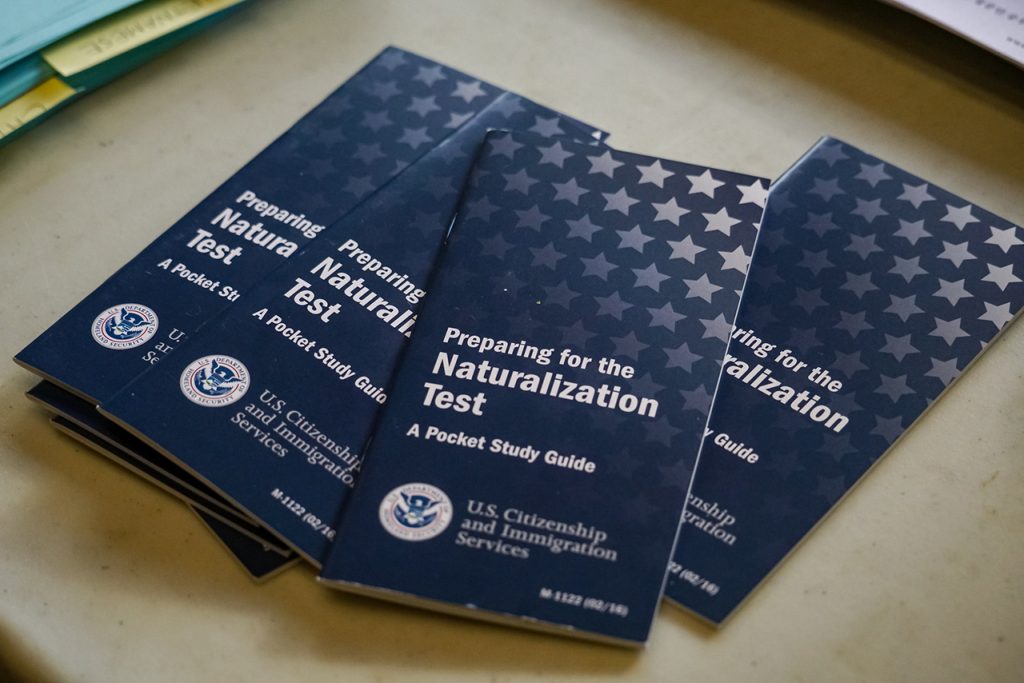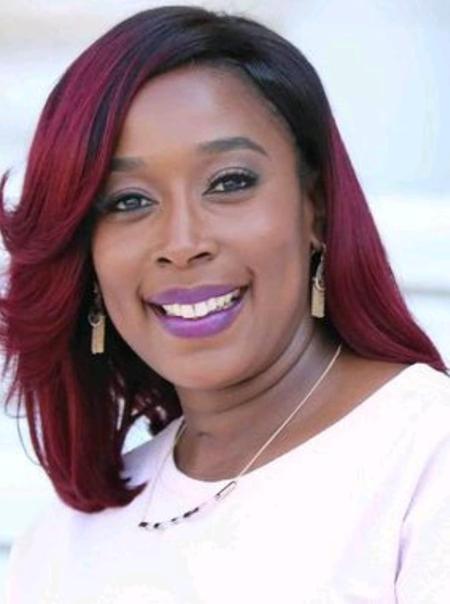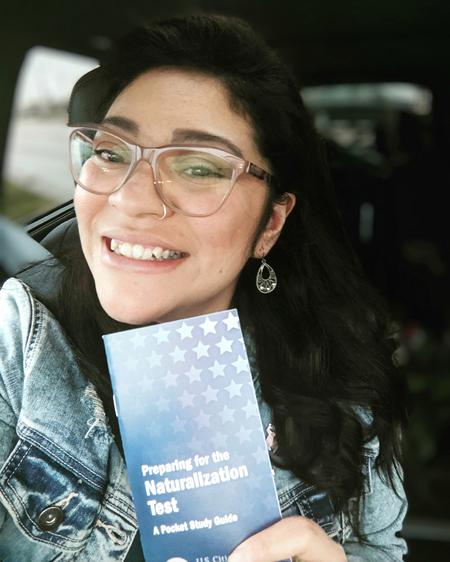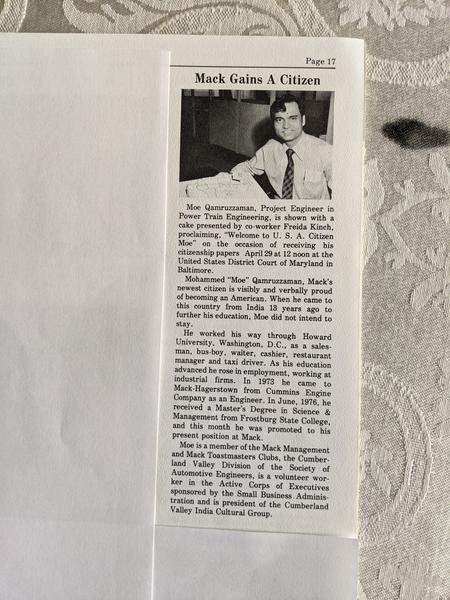Metro Detroiters Share Their Citizenship Journey
Many people come to the land of opportunities for life, liberty and the pursuit of happiness. For about 800,000 people a year, that means applying to become a U.S. citizen.

As part of 101.9 WDET’s Book Club, we’re inviting the Detroit region to examine and discuss the text that impacts every resident of the United States: The Constitution. Whether you’re revisiting the documents or reading them for the first time, join us in reading along and engaging in civil conversations with your community.

Article 1, Section 8, Clause 4 of the U.S. Constitution gives Congress the power to set up a “uniform rule of naturalization,” in other words, a process for becoming a citizen. Though the requirements and restrictions have changed over the decades, millions of immigrants have taken advantage of that opportunity.
Patricia Osburn was in her senior year of high school and wanted a job. But there was one problem. On her Social Security card, it said in large print, “not authorized to work in the United States.”
Osburn is now an educator and life insurance agent. She was born and raised on the small island of Nassau, Bahamas. She lived with her adoptive mother until she was 12 when she was reunited with her birth mother in the United States. Years later, her mom encouraged her to become a naturalized citizen.
“I wanted a job because everybody in high school had a job, and it was something that you did to make money … prom and everything was coming up, and my mom didn’t make a lot of money because there was a lot of us and I said to myself, ‘if I can make my own money, I can buy the things that I wanted to buy for my senior year.’”
Osburn took her mom’s advice and starting studying at the local library. She also took a civics class at school.
“When I was in my high school year is when I really felt the need to become naturalized … my parents felt the need for me to become naturalized and they’re like, oh, you know, it’s something that you need, it’s something that will give you a better opportunity at life …”
She says she was overjoyed after taking her oath of citizenship.
“I literally remember going outside and kissing the ground because I’m like, ‘Yes, I’m able to work now.’ I was so happy!”
Osburn says she values both her Bahamian and American cultures. She says having U.S. citizenship has allowed her to travel around the world and even work in South Korea for 12 years.
Taking the Next Step

Like Osburn, Laura Gutiérrez Pérez came to the U.S. as a child.
She moved to the United States from Mexico City with her parents when she was just 3 years old. Pérez is a stay-at-home mom and former social studies teacher.
Last year she decided to apply for citizenship after 20 years as a legal permanent resident.
“So my parents, we became a resident when I was 8, and my parents could have gotten the citizenship test, and if they would have done that I would have been grandfathered into my citizenship. But they didn’t, because of the language barrier. I think they were really nervous about taking the exam. ‘Til this day they haven’t taken it and I think they’re starting to feel more comfortable with it.”
She says the November 2020 presidential election pushed her to take the next step.
“I think with me having my permanent residency I always had this fear that it would be taken away. I always was afraid to go to protests or even get too involved politically, and I still did but I always had this anxiety about whether that could be used against me if there was ever an issue. I wanted to apply for my citizenship and that showed up on my record.”
Pérez says her parents are waiting to take the test once they hit the age and time exemptions for citizenship, which will allow them to take their test orally in Spanish.
She says while the citizenship test can be daunting for non-native English speakers, the application can be daunting overwhelming for others, making it important to have advocate agencies like La Sed in Southwest Detroit. That’s where Pérez received help filling out her application, an instrumental part in getting citizenship.
Pérez’s citizenship interview was pushed back last year, keeping her from voting in November’s presidential election. While she was looking forward to voting last fall, she says she’s excited for the next big election.
An Opportunity

Muhammed Qamruzzaman is a retired engineer who worked for the U.S. Army in Defense Program Management. He came to the U.S. on a student visa to study engineering in 1964. He got his citizenship in 1976.
Qamruzzaman arrived around the time President Lyndon Johnson signed the Immigration and Nationality Act of 1965, allowing people from Asia, Africa and southern Europe to immigrate to the United States more easily and eventually become citizens. The legislation came about due to the civil rights movement, which prompted the U.S. to revisit discriminatory immigration laws that preferred northern European immigrants.
“At that time there was very small population of Indians and Pakistani. In fact, you can imagine, even [in] Washington, D.C., there was no Indian restaurant or not even Indian grocery store,” he says.
In South Asia, the India-Pakistan war of 1965 raged on. The conflict took place less than two decades after the partition of both countries, which left thousands of people displaced. Qamruzzaman says, at the time, the United States presented an opportunity for many in the region.
“When they changed the national law, India, Pakistan had a lot of engineers and doctors sitting over there, jobless. So they all jumped on this opportunity. And they all applied. Within a year, we had thousands and thousands of Indian and Pakistanis here.”
The U.S. government prioritized those who were educated, like engineers and doctors, to immigrate and work in the U.S.
Once they became citizens, immigrants could apply to bring their parents, siblings and other family members to the U.S. Qamruzzaman says after living here, starting off as a salesman and working his way up to becoming an engineer, he felt inspired to apply for his citizenship.
“At that time citizenship was a celebration, and the city was Columbus, Indiana. They were very proud of the fact that somebody has taken citizenship of the United States,” he says.
His company Mack Trucks even published a story about him in the newspaper in Hagerstown, Maryland.
For many like Patricia Osburn, Laura Gutiérrez Pérez and Muhammed Qamruzzaman, citizenship granted them access to jobs, voting and a chance to reunite with their families.
All three of them say they’re proud to be American citizens.
The U.S. Citizenship and Immigration Services are working with other federal agencies to create a strategy to promote naturalization in communities around the country.
Listen: Three Metro Detroiters share their citizenship stories.
Join WDET in reading the Constitution.
This summer, we invite you to get involved as we explore our nation’s founding document.
Sign up to get your free pocket Constitution
Trusted, accurate, up-to-date.
WDET strives to make our journalism accessible to everyone. As a public media institution, we maintain our journalistic integrity through independent support from readers like you. If you value WDET as your source of news, music and conversation, please make a gift today.
